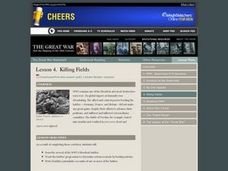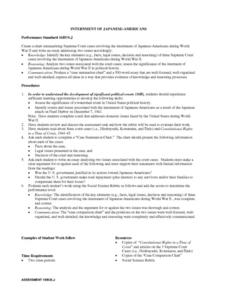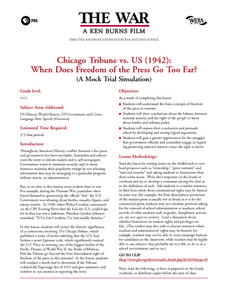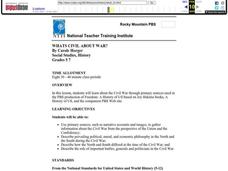Curated OER
Islam: History, Values, and Culture
Providing a thorough outline in the first few slides, this presentation takes viewers through the history and characteristics of Islam. Especially helpful are the slides that clear up common misconceptions about Islam, such as the...
Curated OER
Using Primary Sources to Study the Holocaust
Engage your middle schoolers with Pastor Martin Niemoller's famous poem that begins, "First they came for the communists." Now that you have their attention, send learners to the various work stations you created to have them explore...
Smithsonian Institution
POWs
Why did Vietnam POWs and their families receive more media attention than POWs in previous wars? To answer this question, class members view artifacts, read articles, and engage in class discussion. Individuals then assume the voice of...
Student Achievement Partners
Laura Hillenbrand's "Unbroken" and Jeanne Wakatsuki Houston and James D. Houston's "Farewell to Manzanar"
Passages from Unbroken and Farewell to Manzanar provide the context for a study of the historical themes of experiencing war, resilience during war, and understanding the lasting trauma of war. Appendices include extension activities,...
Echoes & Reflections
Studying The Holocaust
While many young scholars are familiar with the Holocaust, they may not understand the specific history that led to the unprecedented atrocity. The first lesson in the unit helps teachers gauge their pupils' background knowledge. A...
Curated OER
The Cold War (1945–1963)
For this online interactive history worksheet, students respond to 8 short answer and essay questions about the Cold War. Students may check some of their answers on the interactive worksheet.
Curated OER
"The New Television Set" a Gateway to the Post World War II Era
Eleventh graders demonstrate their knowledge of the effects of television on the political, economic, religious, social, intellectual and artistic life of the US nation from the 1950's. Research how television shaped public opinion with...
Curated OER
Gunpowder and the Explosion of World War
Students consider how technology changed the world of war. In this world history instructional activity, students research 20th century world conflicts and then compose essays that feature the how technology changed the way that wars...
Curated OER
Double V Campaign: Victory at Home and Victory Abroad
Students write a persuasive essay as if they were an African American in World War II and decide if they would contribute war bonds or not. In this World War II lesson plan, students study the segregation of World War II and the unity...
Curated OER
Who Was Responsible for the Start of the Cold War?
Students determine who is responsible for the start of the Cold War. In this Cold War lesson, students conduct their own research about the evolution of the war and write essays that reveal their opinion on how the war began.
Curated OER
Prisoner of War Camps In Germany- Crossword
For this history crossword puzzle worksheet, students read and analyze 12 clues pertaining to the prisoners of war in Germany during Word War II. Students fit their answers into a crossword puzzle, which has no word bank.
Curated OER
Japanese Prisoner of War Camps
In this World War II worksheet, students read the 10 clues about Japan's prisoners of war during the war. Students use the clues to find 10 words to complete the crossword puzzle.
Spark Notes
The Interwar Years (1919-1938): Study Questions
In this online interactive history worksheet, students respond to 10 short answer and essay questions about years between World Wars I and II.
Curated OER
GRAVE OF THE FIREFLIES
Students engage in a video activity to research the effects of war upon the Japanese to live in the world after World War II. They answer specific questions in order to complete the unit.
Curated OER
Wilson's 14 Points
Young scholars analyze political cartoons representing the role of the U.S. in the Post-World War One Era. They work in groups and analyze cartoons for their stereotypes, symbols, and caricatures. After analyzing them, they complete a...
Japan Society
Japan in the World Since 1945
What have US-Japanese relations been like since the conclusion of World War II? Why do some commentators identify Japan's postwar years as a subordinate independence? Invite your young historians to research Japan's status in the world...
Curated OER
Lesson 4. Killing Fields
Eleventh graders describe several of the WWI's bloodiest battles, track the battles' progression to determine advances made by leading nations, and write frontline journalistic accounts of one or more of the battles.
Curated OER
Internment of Japanese-Americans
Students assess the significance of a watershed event in the political history of the United States . They identify events and issues associated with the internment of Japanese-Americans as a result of the Japanese attack on Pearl Harbor...
Curated OER
Chicago Tribune vs. US (1942): When Does Freedom of the Press Go Too Far?
Students define freedom of the press in peace and war time. As a class, they identify the need for the public to be informed, but discuss where the line should be drawn to protect national security. They develop their arguments and...
Curated OER
D-Day: June 6, 1944
Students examine the preparations for the invasion of France on June 6, 1944. After viewing a clip from "The War", they identify the demands and concerns of all military leaders for this invasion. They use maps to examine the...
Curated OER
What's Civil About War?
Students study about the Civil War through primary sources used in the PBS production of "Freedom: A History of US" based on Joy Hakim's books, "A History of US", and the companion PBS Web site.
Curated OER
The Cold War: Solving the Mystery of History with Voices on Vinyl
Eighth graders explore the Cold War Era. In this world history lesson, 8th graders discover the positions taken by countries during the Cold War as they listen to lectures regarding the major events and turning points in the Cold War....
Curated OER
Non-Violence Means "Doing Nothing"
Students reflect on violence and non-violence. In this World History lesson, students read an article by Gandhi then write an essay as to whether they agree or disagree with his thoughts. Students then share all their ideas as a class.
Curated OER
The Berlin Airlift
Students examine a document from the Berlin Airlift in order to research his important event in World History.

























